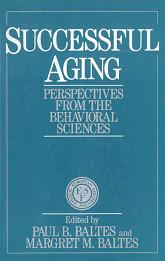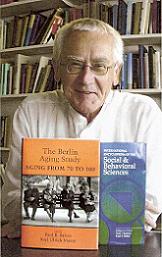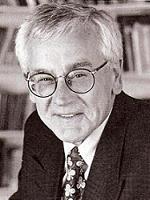|
Successful Aging: Perspectives from the Behavioral
SciencesŁ (1990) edited by Margret and Paul Baltes is
considered a milestone for the perspective renewal of
psychological aging research. In this book, the editors
substantiated a theoretical model that has ever since
convinced scientists with its expanded view on human
development in adult and old age. Hitherto gerontological
research had concentrated on the reduced capabilities of
elder persons. The positive development, by contrast, and
mechanisms of compensation for deficits were first by the
Baltes put on the research agenda. For many years the two
scientists had proved in their own work that the fixation on
deficits had led to significant and unjustified narrowing and
hence inadvertence to major characteristics of aging. With
Successful AgingŁ they presented the theory of
Selective optimization with compensation and established
the new paradigm in science. According to their theoretical
model, human beings compensate for capacity losses by
selecting functional areas and resources for successful
operations. With experience, social authority and specific
aging resources elder people are able to optimize their
action and success in their environment.
The
achievements of Margret and Paul Baltes stretch well beyond
this new view on aging. They made clear that the period of
old age needs to be put into the perspective of the whole
lifespan. As any phase of individual human development it is
characterized by losses and gains. Such gains mark especially
the third ageŁ, i.e. approximately the period between 65
and 80 years of age. This refers to higher social and
emotional competence, historical and life experience and the
ability of pointed use of resources. Elder people thereby not
only master their lives successfully and have a positive
impact on society but also continue developing as
personalities.
Margret Baltes' outstanding work in
gerontology has contributed most significantly to scientific
progress in the discipline and to enhancing knowledge on
matters of psychological aging research. Here one has to
mention her research on the appearance, maintenance and
modification of dependent behavior of elder people. That
research, presented since the mid 1970s, was inspired by
learning theories. Margret Baltes specified empirically the
key role that the social environment comes to play. She
identified patterns of dependency support that are nowadays
considered part of the classical canon of psychological
gerontology. Her work supported the idea that aging is not
determined by regress of biological capabilities but that
instead spacial and social conditions are significant factors
of influence. The process of aging can be shaped actively.
The evidence of high plasticity of behavior in old age was
incorporated in changed training programs for care staff whose
attention to keeping and sustaining elders' autonomy was
promoted.
Further research dealt with everyday
competences. Margret Baltes developed an interdisciplinary
model and predictors for interindividual differences. She
also focused on cognitive plasticity in old age, especially
with regard to processes of dementia. With the help of
testing the limits she contributed to early diagnostics
of dementia and demonstrated the relevance of psychological
methods for dementia research.
Paul Baltes became interested in the potential of cognitive
functions of adults and in old age at an early stage of his
career. His work on cognitive training research demonstrated
empirically the chances for cognitive development in adult
and old age but also showed its limits. The interest in the
potential of old age was the starting point for his
psychological research in one of the few positive aging
stereotypes (wisdom). He established a new survey model.
The results led to relativize the link between wisdom and age
However, people do not automatically become wise when they age but
such development is a rarely traveled path. Paul Baltes also
undertook research on reasons for functional losses. He found
evidence that listening, watching and walking demand more
cognitive resources with increasing age. More recently, he
advocated linking research in behavioral development to
analyses of neuronal mechanisms and societal
conditions.
Paul Baltes initiated the Berlin Aging
Study (BASE) that combines biomedical, psychia-tric and
psychological with sociological and economic views on aging.
Together with Neil Smelser he edited the International
Encyclopedia of the Social and Behavioral Sciences (Elsevier
2001). Paul Baltes launched the International Max Planck
Research School The
Life Course: Evolutionary and Ontogenetic Dynamics
(LIFE) , a common and interdisciplinary doctoral
program of the Berlin Max Planck Institute for Human
Development, Humboldt University and Free University of
Berlin and the Universities of Michigan and Virginia. The
research school is devoted to research on systemic change in
human behavior and different time horizons of evolution and
ontogenesis. In 2004 Paul Baltes came up with the Max
Planck International Research Network on Aging. It is a
successful interdisciplinary virtual institute under the
participation of the Max Planck Society, the Swedish
Karolinska Institute and the University of Virginia. In the
same year, he initiated the interdisciplinary working group
"Chances and Problems of an aging societyô the world of
work and lifelong learning today named Joint
Academies Initiative on Aging in Germany. The
Initiative is supported by the German Academy of Sciences
Leopoldina and the German Academy of Science and Engineering
(acatech) and is funded by the Jacobs Foundation. |
|


Paul Baltes pr´┐Żsentiert die erste
englischsprachige Ausgabe der Berliner Altersstudie,
erschienen 1999 (Aufnahme aus dem Jahr 2000)

Paul Baltes mit einer neuen Auflage der
BASE-Studie und der International Encyclopedia of the
Social and Behavioral Sciences, die er zusammen mit
Neil Smelser herausgab

Margret Baltes 1987 beim Successful
Aging Workshop der European Science Foundation in
Schloss Ringberg

Paul Baltes als Direktor am
Max-Planck-Institut in Berlin 1998
| |

